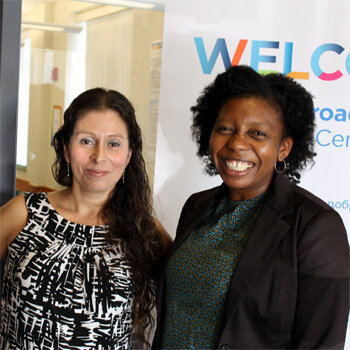Innovations in Care - Behavioral health staff are now part of your care team

Juana, (left) overcame domestic violence with the help of her mental health care partner, Rina Bernardez (right).
The bruise on Juana’s wrist was easy to see and she didn’t try to hide it when she brought her daughter to a regular doctor’s visit. “My husband and I argued the night before and he held my hand so hard it left a huge bruise,” Juana explained with a stoic expression. “My daughter told her provider at CHA Broadway Care Center” in Somerville.
Virginia Smith, APRN, a CHA Family Medicine provider, asked Juana to wait for a moment and that’s when Rina Bernardez and Juana first met. They looked at each other and smiled as they remembered that moment. “That’s when I found out that someone cared and I could get the help I needed,” said Juana.
Things weren’t easy from there. In fact, Juana remembers it as a disaster. She met her husband 22 years ago, two years after moving to the United States from El Salvador. After her daughter was born, her second child, her marriage went from bad to worse. He started drinking and although they tried to make it work, and he promised he would stop, he’d always go back to the same behavior. Juana had made a decision to end it, but didn’t know where to turn.
With only her sister in the United States, she was isolated and fearful of what could happen. “People told me that the government would come and take my children if I did anything,” Juana looked at Rina as she spoke. “I wasn’t sure what to do.”
Rina fills one of the 11 new Mental Health Care Partner positions in CHA Care Centers in Malden, Everett, Revere, Cambridge and Somerville. Her position is to provide support and coaching for patients with mental health conditions, and to help with coordinating mental health care. The Mental Health Care Partner (MHCP) is one of three behavioral health roles now embedded into CHA primary care locations. Each CHA Care Center also has at least one full time therapist and a psychiatrist that comes in weekly to help manage patients’ medications.
The Integrated Care Model is a new way of thinking about care. Making sure that patients have access to mental health support when they need it, in the primary care setting. This is a place they feel comfortable visiting and offers an addition to the care team they know and trust.
Juana tried to get her husband to move out voluntarily, but he wouldn’t leave. “One night he came home at 3 a.m. and was very drunk,” Juana’s eyes filled with tears as she recalled that scary time. “He woke up the kids and then started throwing me all around, all over the sofas. My kids went to school in the morning and told their teachers everything. DCF (Department of Children and Families) was in my home the next day.”
Rina helped Juana connect with CHA Victims Resource Center (VRC); through this service, she was able to receive direct support from social workers dedicated to assist, educate and connect victims with legal services in the community supporting her through the long legal process of finalizing her divorce and ensuring that she gets translation services along the way.
Other local services like CAAS, a community action agency focused on ending homelessness, helped Juana get housing.
Juana started seeing Peter Young, LICSW (one of the integrated therapists at CHA Broadway Care Center), for additional emotional support and work on developing coping strategies. “I was getting panic attacks when I was upset,” said Juana. “I wanted to deal with my feelings and not numb them with medication.”
“Most people don’t have experience with getting therapy,” Rina explained. “We introduce people to therapy with an introductory meeting to educate and clarify people’s perceptions.” Juana added, “There’s a stigma. People think ‘I’m going crazy’, but it’s about getting help so that you don’t go crazy. It’s all about taking care of yourself.”
Juana still calls Peter periodically. “I’m doing so much better,” she said. “Rina and David from CAAS really helped me, but the main person who helped me was me. I want people who are suffering to please speak up.”
If you’re experiencing depression, unhealthy relationships, addiction, or any mental health challenge, call your primary care provider to learn about CHA’s integrated mental health services. Our providers are here to give you support when you need it.
Disclaimer
This articles provide general information for educational purposes only. The information provided in this article, or through linkages to other sites, is not a substitute for medical or professional care, and you should not use the information in place of a visit, call consultation or the advice of your physician or other healthcare provider.
BACK